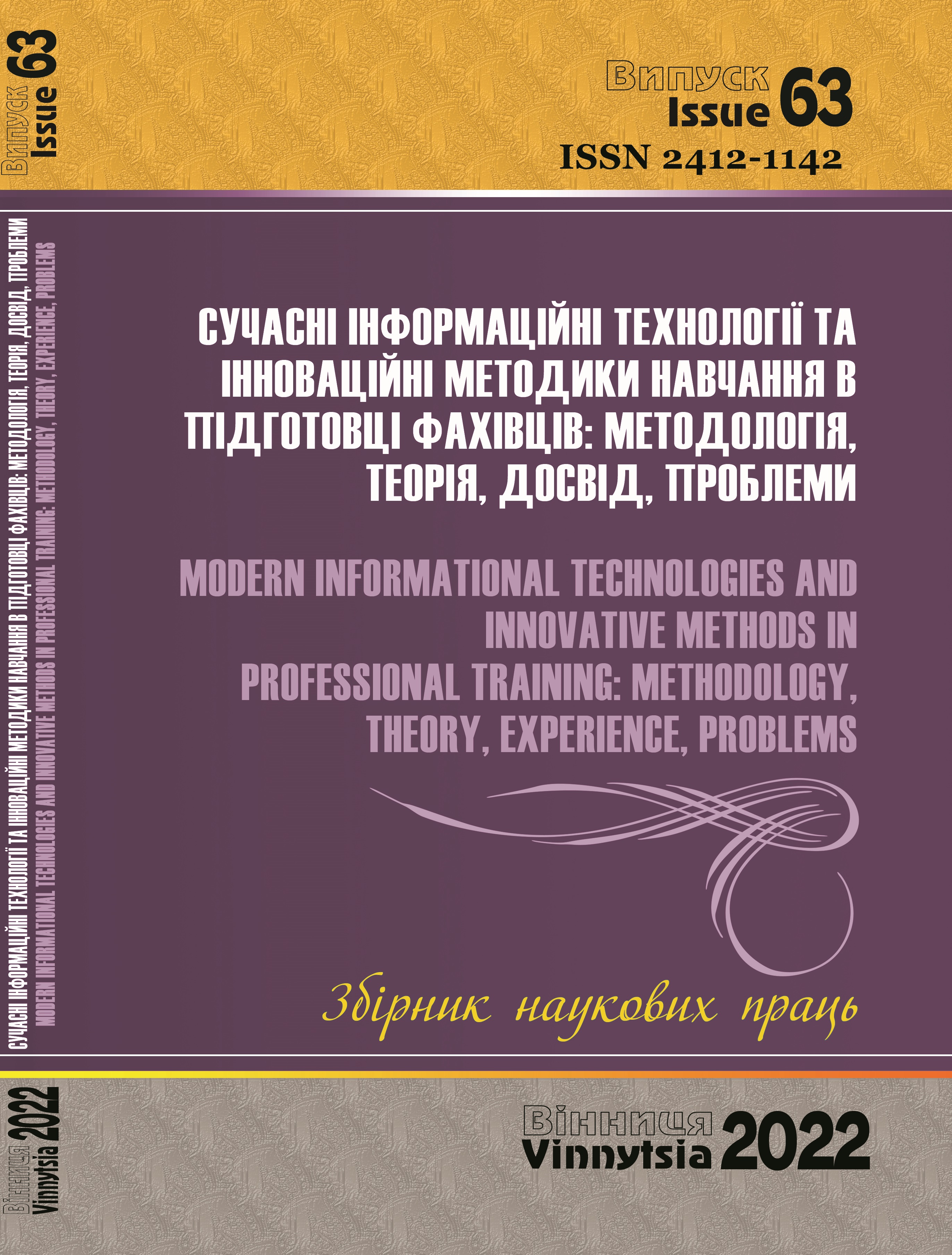DIDACTIC POTENTIAL OF USING DIGITAL CONTENT WITH AUGMENTED REALITY
DOI:
https://doi.org/10.31652/2412-1142-2022-63-39-57Keywords:
virtual reality; augmented reality; extended reality; mixed reality; immersive technologies in education, school education, didactic potential of technologyAbstract
During the studies, long-term trends were screened (based on the materials of worldwide
forecasts and thematic reviews); global socio-economic and scientific-technological challenges related to
the field of ICT were analyzed; potential opportunities for the use of virtual, augmented and mixed reality
technologies for the purpose of education were assessed. The authors analyzed the practical experience of
domestic and foreign scientists in the field of computer-based pedagogical technologies for the use of VR
and AR in the process of education; methods of comparative analysis and testing of digital applications and
educational services were applied.
Some concepts necessary for unambiguous understanding of the presented results are described:
immersiveness, objects of immersive technologies, sense of presence, virtual reality, augmented reality,
extended reality, mixed reality, substituted reality, virtual and augmented metaverse.
The article briefly outlines the areas of practical application of virtual and augmented reality technologies
in business, manufacturing, corporate training. Researchers focus on the use of augmented reality
technology in the educational process: gaming and augmented reality technology, educational digital
content based on augmented reality technology; review of educational mobile applications which
support augmented reality technology; application of Khan's generalized model of e-education.
The expansion of the visual possibilities of school textbooks through the use of interactive models, video
images and augmented reality objects, in particular for natural sciences and mathematics, is insufficiently
researched and therefore relevant for further research. The validity and effectiveness of such studies will
depend on the availability and status of the development of appropriate criteria and indicators for evaluating
educational digital content, in particular that, which includes augmented reality content.
Downloads
References
О. P. Pinchuk, "Digital humanistic pedagogy as a new challenge to the competency of a modern teacher", in Actual problems of natural and mathematical education in secondary and high school, Kherson, 2018, pp. 13-14. [Online]. Available: http://lib.iitta.gov.ua/711699/.(in English)
O. P. Pinchuk, S. G. Lytvynova, and O. Yu. Burov, "Synthetic educational environment – a footpace to new
education". Information Technologies and Learning Tools, vol. 4, no 60, pp. 28-45, 2017. [Online]. Available:
https://journal.iitta.gov.ua/index.php/itlt/article/view/1831. (in English)
H. Rheingold, Virtuelle Welten und Reisen im Cyberspace. New York, USA, 1991. (in German)
Transforming Education. Microsoft, 2018. [Online]. Available: https://news.microsoft.com/wp-
content/uploads/prod/sites/66/2018/06/Transforming-Education-eBook_Final.pdf(in English)
10th International Conference on Applied Human Factors and Ergonomics and the Affiliated Conferences
Proceedings of the AHFE 2019 International Conference on Human Factors in Training, Education, and Learning
Sciences, held on July 24–28, 2019, in Washington D.C., US. [Online]. Available: https://doi.org/10.1007/978-3-
-20135-7. (in English)
O. Pinchuk, O. Burov, and S. Lytvynova, "Learning as a Systemic Activity", in Advances in Human Factors in
Training, Education, and Learning Sciences, W. Karwowski, T. Ahram, and S. Nazir (eds) AHFE 2019. Advances
in Intelligent Systems and Computing, vol. 963. Springer, Cham, 2020. [Online]. Available:
https://doi.org/10.1007/978-3-030-20135-7_33. (in English)
L. Caprara, and C. Caprara, "Effects of virtual learning environments: A scoping review of literature", Educ Inf
Technol, 2021. [Online]. Available: https://doi.org/10.1007/s10639-021-10768-w. (in English)
N. Pellas, I. Kazanidis, and G. A "Palaigeorgiou, systematic literature review of mixed reality environments in K-
education", Educ Inf Technol, vol. 25, pp. 2481–2520, 2020. [Online]. Available:
https://doi.org/10.1007/s10639-019-10076-4. (in English)
H. Altinpulluk, "Determining the trends of using augmented reality in education between 2006-2016", Educ Inf
Technol, vol. 24, pp. 1089–1114, 2019. [Online]. Available: https://doi.org/10.1007/s10639-018-9806-3.
(in English)
K. Okoye, J.A. et al. "Technology-mediated teaching and learning process: A conceptual study of educators’
response amidst the Covid-19 pandemic", Educ Inf Technol, vol. 26, pp. 7225–7257, 2021. [Online]. Available:
https://doi.org/10.1007/s10639-021-10527-x. (in English)
S. Mystakidis, A. Christopoulos, and N. Pellas, "A systematic mapping review of augmented reality applications
to support STEM learning in higher education", Educ Inf Technol, 2021. [Online]. Available:
https://doi.org/10.1007/s10639-021-10682-1. (in English)
A. Striuk, M. Rassovytska, and S. Shokaliuk, "Using Blippar Augmented Reality Browser in the Practical Training
of Mechanical Engineers", in 14th International Conference on ICT in Education, Research and Industrial
Applications. Integration, Harmonization and Knowledge Transfer (ICTERI, 2018), Kyiv, 2018, pp. 412-419.
[Online]. Available: http: // ceur- ws.org/Vol-2104/paper_223.pdf. (in English)
E. Rogers, Diffusion of Innovations, Simon and Schuster, 2003. (in English)
M. Hirooka, Innovation Dynamism and Economic Growth: A Nonlinear Perspective. Edward Elgar Publishing,
(in English)
C. M. Clayton, The Innovator's Dilemma: When New Technologies Cause Great Firms to Fail, Boston, USA :
Harvard Business School Press, 1997. (in English)
Ch. Freeman, and L. Soete, The Economics of Industrial Innovation. Psychology Press, 1997. (in English)
E. Costanza, A. Kunz, and M. Fjeld, Mixed Reality: A Survey. In: Human Machine interaction: Research Results
of the MMI Program, 2009. [Online]. Available: http://www.t2i.se/pub/papers/springer_5440.pdf. (in English)
C. C. Yang, Hs. Chen, and K. Hong, "Visualization of large category map for Internet browsing", in Decision
Support Systems, vol. 1, no 35, pp. 89–102, 2003. [Online]. Available: 10.1016/S0167-9236(02)00101-X
(in English)
E. Bezegová, M. A. Ledgard, R.-Ja. Molemaker, B. P. Oberč, and A. Vigkos, "Virtual reality and its potential for
Europe". Ecorys, 2017. (in English)
J.-M. Cieutat, O. Hugues, and N. Ghouaiel, "Active Learning based on the use of Augmented Reality Outline of
Possible Applications: Serious Games, Scientific Experiments, Confronting Studies with Creation, Training for
Carrying out Technical Skills", International Journal of Computer Applications, IJCA, 46 (20), pp. 31-36, 2012.
(in English)
P. Milgram, and F. Kishino, "A Taxonomy of Mixed Reality Visual Displays", IEICE Trans. Information Systems,
vol. E77-D, no. 12, 1321-1329, 1994. (in English)
E. P. Popechytelev, and A. Yu. Burov, " Synthetic learning environment: design features", Information
Technologies and Learning Tools. vol. 66, no. 4, pp. 1-13, 2018. (in Russian)
А. М. Striuk, "Designing Augmented Reality Educational Objects", Automated control systems, Transactions, vol.
(26), pp. 127-134, 2018. (in Russian)
K. Werbach, and D. Hunter, For the Win: How game thinking can revolutionize your business. Wharton Digital
Press, 2012. (in English)
Downloads
Published
Issue
Section
License
Copyright (c) 2022 Ольга Пінчук, Лілія Лупаренко

This work is licensed under a Creative Commons Attribution 4.0 International License.





